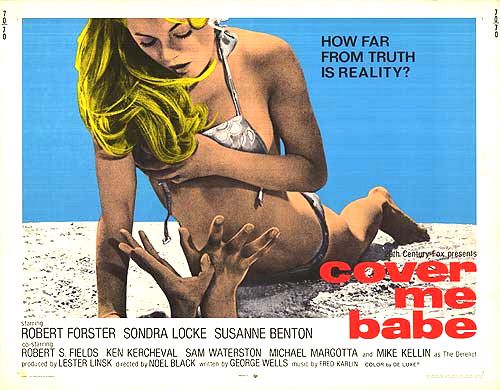I don’t know if I’ve ever come across a non-horror film that featured a more off-putting lead character than Tony, the protagonist of 1970’s Cover Me, Babe.
A film student, Tony (Robert Forster, even in 1970, who was too old for the role) aspires to make avant-garde films. Everyone in the film continually raves about how talented Tony is. The footage that we see, however, tends to suggest that Tony is a pretentious phony. The film opens with footage of a student film that Tony shot, one that involves his girlfriend, Melisse (Sondra Locke) sunbathing in the desert and getting groped by a hand that apparently lives under the sand. It was so self-consciously arty that I assumed that it meant to be satirical and that we were supposed to laugh along as Tony assured everyone that it was a masterpiece. And, to be honest, I’m still not sure that Cover Me, Babe wasn’t meant to be a satire on film school pretension. I mean, that explanation makes about as much sense any other. (Hilariously enough, Tony’s film had the same visual style as the film-within-a-film around which the storyline of Orson Welles’s The Other Side of the Wind revolved. At least in the case of Welles, we know that his intent was satirical.)
Tony is not only pretentious but he’s also a bit of a prick. He treats Melisse terribly and he manipulates everyone around him. He wanders around the city with his camera, filming random people and then editing the footage together into films that feel like third-rate Godard. He answers every criticism with a slight smirk, the type of expression that will leave you dreaming of the moment that someone finally takes a swing at him. Tony’s arrogant and he treats everyone like crap but, for whatever reason, everyone puts up with him because …. well, because otherwise there wouldn’t be a movie. Of course, eventually, everyone does get sick of Tony because otherwise, the movie would never end.
A Hollywood agent (Jeff Corey) calls up Tony and offers to get him work in Hollywood. Tony is rude to the guy on the phone. Tony meets a big time producer who could get Tony work. Tony’s rude to him. Guess who doesn’t get a job? Tony has to get money to develop his latest film from one of his professors so he’s rude to the professor. Guess who doesn’t get any money? Tony cheats on his loyal girlfriend. Tony’s cameraman (played by a youngish Sam Waterston) walks out when Tony tries to film two people having sex. By the end of the movie, no one wants anything to do with Tony. Tony goes for a run on the beach. He appears to be alienated and disgruntled. We’re supposed to care, I guess.
The problem with making a movie about an arrogant artist who alienates everyone around him is that you have to make the audience believe that the artist is talented enough to justify his arrogant behavior. For instance, if you’re going to make a movie about a painter who is prone to paranoid delusions and obsessive behavior, that painter has to be Vincent Van Gogh. He can’t just be the the guy who paints a picture of two lion cubs and then tries to sell it at the local art festival. You have to believe that the artist is a once-in-a-lifetime talent because otherwise, you’re just like, “Who cares?” The problem with Cover Me, Babe is that you never really believe that Tony is worth all of the trouble. The film certainly seems to believe that he’s worth it but ultimately, he just comes across as being a jerk who manipulates and mistreats everyone around him.
That said, from my own personal experience, a lot of film students are jerks who treat everyone them like crap. So, in this case, I think you can make the argument that Cover Me, Babe works well as a documentary. The fact of the matter is that not every film student is going to grow up to be the next Scorsese or Tarantino or Linklater. Some of them are going to turn out to be like Tony, running along the beach and wondering why no one agrees with him about George Stevens being a less interesting director in the 50s than he was in the 30s. As a docudrama about the worst people that you’re likely to meet while hanging out on campus, Cover Me, Babe is certainly effective. Otherwise, the film is a pretentious mess that’s done in by its unlikable protagonist. Everyone in the film says that Tony has what it takes to be an important director but, if I had to guess, I imagine he probably ended up shooting second unit footage for Henry Jaglom before eventually retiring from the industry and opening up his own vegan restaurant in Vermont. That’s just my guess.

